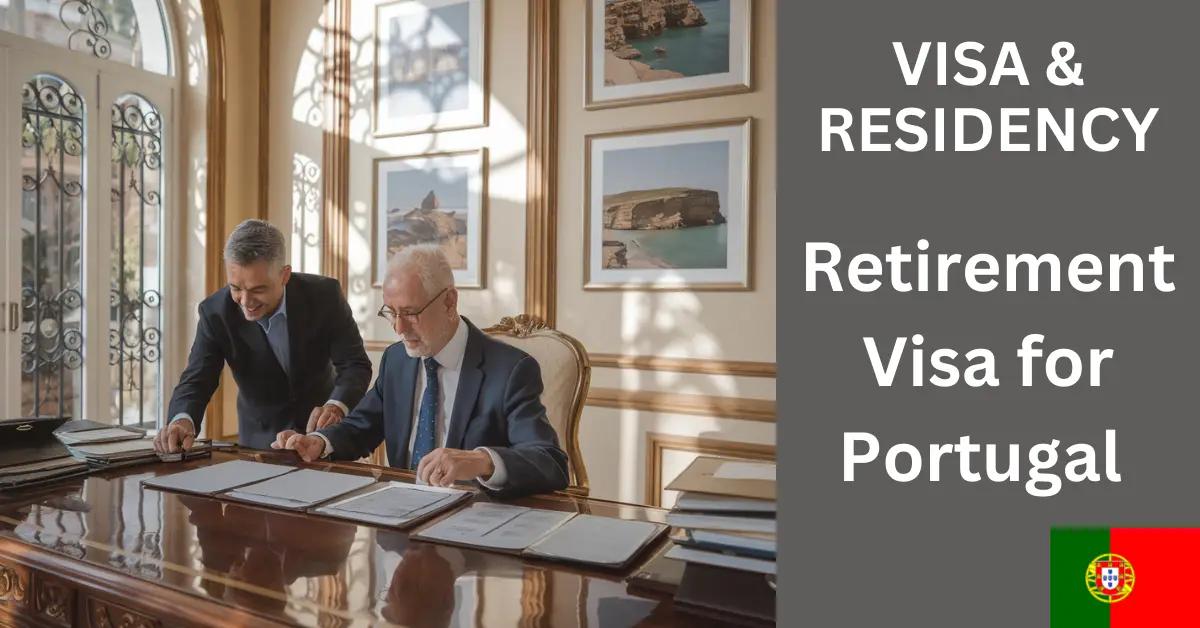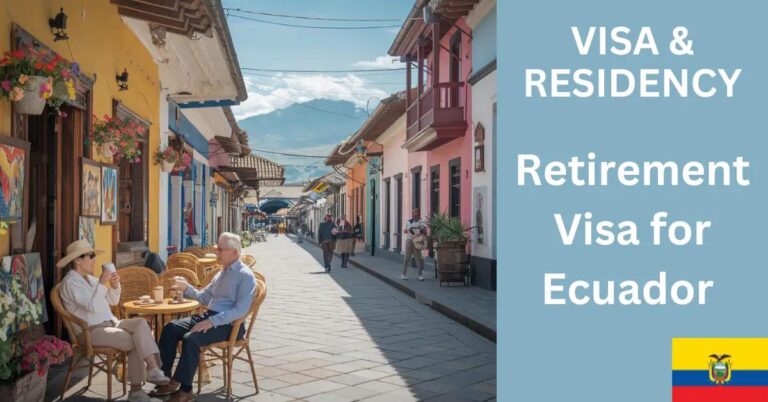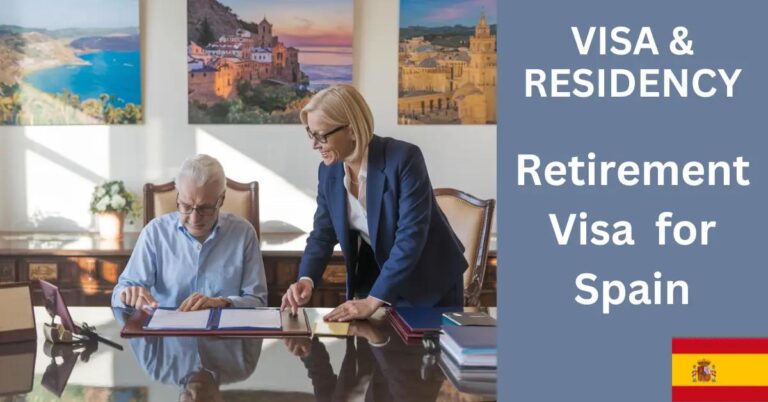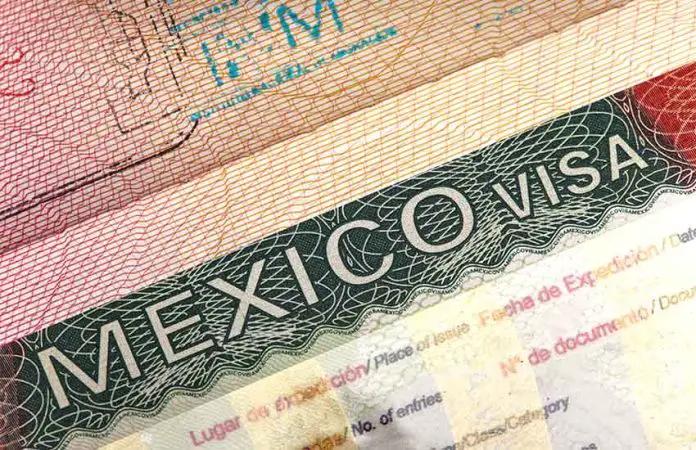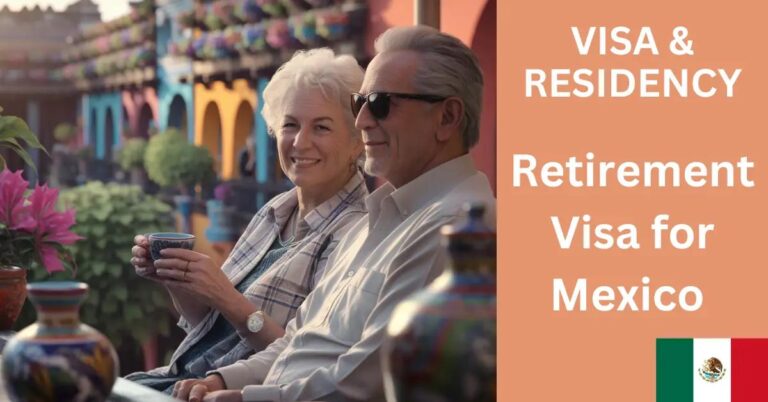TL;DR:
- Retirement visa in Portugal requires proof of stable income (minimum €705/month) and health insurance.
- Essential documents: passport, proof of income, health insurance, Portuguese NIF.
- US citizens can apply via D7 or Golden Visa; D7 focuses on stable income, Golden Visa on investments.
- Cost of living ranges from $2,000 to $3,000/month, varies by region.
- Health insurance mandatory, choose public or private coverage.
- Visa process: gather documents, apply through Portuguese consulate, may take 6 months.
- Residency benefits: high-quality, affordable life, NHR tax benefits, access to Schengen Zone.
- Financial planning: budget, taxes (NHR), pension transfer, Portuguese bank account.
Are you dreaming of sunlit shores and a worry-free retirement? The retirement visa process in Portugal might be your ticket to paradise. As a seasoned guide for global nomads, I’ll walk you through Portugal's retirement visa requirements. From financial criteria to necessary documentation, I'll cover everything to ease your journey. Ready to embrace the Portuguese way of life? Let’s dive into the essentials for living your golden years in Portugal.
Retirement Visa Requirements for Portugal
So you're ready to retire in Portugal? Here's what you'll need to know.
What are the retirement visa requirements for Portugal? You must have a stable income and health insurance. You need to prove that you can support yourself.
To begin, let's talk about financial criteria. How much money do you need to get a retirement visa in Portugal? You need an income of at least €705 per month. This is the minimum monthly income required by Portugal. However, to live comfortably, a higher income is often needed.
Pensions, savings, or investment incomes can be shown as proof. Ensuring your income is steady is critical. This helps you meet the income threshold and stay stress-free in your new home.
Next, we need to dive into the documentation. This part is crucial to the visa application. You must provide proof of income, a valid passport, and health insurance. You'll also need a Portuguese NIF number. The NIF is your tax ID in Portugal.
How do you get a NIF and Portuguese tax ID? You can get your NIF through a personal visit to a tax office. Having a local fiscal representative helps if you are not yet living in Portugal. This number is essential for any financial transactions.
Getting the retirement visa can be smooth when you know the steps. Make sure all documents are ready and checked. Keep track of expiration dates to renew them in time.
So, ready to start this exciting chapter? Make sure you meet the requirements. With all your documents ready, you’re on the right track. Portugal awaits with its beautiful landscapes and warm culture. Don’t let the process overwhelm you. It's a fresh start to enjoy life in a stunning setting.
Portugal Residency for Retirees
Can US citizens retire to Portugal? Yes, they can. US citizens have options like the D7 Visa or the Golden Visa. Each offers a path to peaceful Portuguese living. The D7 Visa is known for favoring retirees. It requires proof of a stable income source, such as a pension. This option is ideal for those seeking a simple retirement. Meanwhile, the Golden Visa is for those interested in investment opportunities. Buying a property worth a minimum amount can qualify you.
What are the benefits of Portugal residency for retirees? Many! You'll experience a high-quality yet affordable life. Portugal's healthcare system is robust, making it appealing for retirees. The welcoming weather and sunny beaches add to its charm. Residents also get the Non-Habitual Residents (NHR) tax benefit, reducing tax burdens.
Now, let's look at the long-term stay options in Portugal. The residency permits initially last one to two years. After renewing, you can apply for permanent residency after five years. Access to the Schengen Zone is a big plus. This allows easy travel around Europe, elevating your retiree adventures.
Exploring the differences between the D7 Visa and the Golden Visa is crucial. The D7 is cost-effective, focusing on proof of regular income. It's suitable for retirees ready to settle in Portugal without huge investments. The Golden Visa, however, requires a significant financial commitment. It targets individuals with strong investment inclinations. Each visa has distinct benefits tailored to different retiree needs.
The visa types and benefits make Portugal a top choice for retirement. This country offers more than just residency; it provides a newfound home. By understanding these options, you can choose what best suits your retirement dreams.
Financial Requirements for Portugal Retirement Visa
How much annual income do you need to retire in Portugal? You need a minimum monthly income of about €705. When it comes to the financial requirement for a retirement visa in Portugal, your pension and savings play a big part. The income threshold begins at around the national minimum wage. However, having more income is often better.
The income level is not just one figure. It depends on your family size. For a couple, you should ideally have around €1,060 monthly. If you have kids, it's smart to plan for even more. These amounts are in line with Portugal's official requirements for the D7 visa.
Pension and savings can prove your financial stability. A steady pension confirms reliable income. Savings back up your financial security. It is wise to prepare detailed records of your pension payouts. Also, have evidence of your savings accounts ready.
What kind of supporting financial documentation will you need? Bank statements are vital. They prove your income and available savings. You should also show proof of regular pension payments. These documents paint a full picture of your financial health.
Here are a few tips for meeting the financial criteria. First, maintain clear financial records. Ensure all statements and documents are recent. Second, consult a financial advisor. They can assist in preparing your documents. They can also help you project future finances.
Meeting the financial requirements might seem tough at first. But with a good plan, it's feasible. Ensuring you meet these requirements increases your chances of a successful visa application. With the right preparation, Portugal's retirement landscape is within reach.
Health Insurance for Portugal Residency
What are the health insurance requirements for Portugal residency? In Portugal, expats need health insurance. It is key for all seeking residency. Without it, your visa application could be at risk. You must show proof of coverage when applying.
How do you obtain suitable health insurance coverage? You can choose between public and private covers. Public healthcare in Portugal is affordable and of good quality. But, private healthcare offers shorter wait times. Some expats mix both for complete coverage. Always check if insurance plans meet residency rules.
Understanding Portugal's healthcare system is vital. The Serviço Nacional de Saúde (SNS) is the public option. It is low-cost but may have longer wait times for certain treatments. Private healthcare, though possibly more costly, offers swift service. Many expats prefer a private plan for emergencies.
When selecting insurance, think about your needs. Are you covering just you or family too? What are your specific health needs and potential future health concerns? Comparing plans helps you choose well. Look for coverage that includes both routine and emergency care.
With suitable health insurance in place, you can enjoy peace of mind. It allows you to focus on other steps towards your residency. Remember, healthcare is not just a mandatory requirement; it’s also an essential part of well-being. You don't want surprises when it comes to health. Secure your plan, enjoy your new life in Portugal.
Portugal Visa Application Process
You're dreaming of retiring in Portugal, but you're unsure about the retirement visa process. Here's a step-by-step guide to make it clear. First, gather your documents, including proof of income and health insurance. Then, submit your application to a Portuguese consulate in the USA.
How long does it take? It takes six months on average to get the visa. After applying, expect a confirmation email from the consulate. Keep an eye on your email for any requested documents or details.
Retirement visa process for Portugal from the USA: Start by applying at the nearest Portuguese consulate. Schedule and attend a personal interview. At the interview, answer questions and submit your biometric data.
Now, you might wonder about interviews and assessments. You will need to attend an interview at the consulate. Here, they check your information and verify your intent to live in Portugal.
The timeline can be overwhelming. Rest assured, it often varies due to paperwork or holidays. Plan ahead and give yourself extra time for each step.
Everyone faces challenges while seeking visas. One common issue is missing documents. Double-check your application, and ensure all forms are complete and files uploaded before submission.
Another issue? Language barriers. Many consulate staff speak English, but it’s useful to learn basic Portuguese phrases. This helps in interaction during the process, showing respect for the culture.
If you hit a snag, don't panic. Contact the consulate for help or clarification. They regularly provide updates on the status of your application.
Challenges can be solved with patience and preparation. Enjoy the excitement and see each step as one closer to your dream life in Portugal.
Cost of Living in Portugal for Retirees
When planning retirement in Portugal, it's important to consider living expenses. Generally, a comfortable life here costs around $2,000 to $3,000 per month. This includes housing, food, healthcare, and leisure. But remember, your cost can vary based on lifestyle choices.
Retiring in Portugal has some downsides. One is the growing cost in bigger cities like Lisbon and Porto. Prices here can be high compared to smaller towns. Additionally, there may be language barriers, though many locals speak English.
There are differences in costs depending on the region. Living in a rural area like the Alentejo is cheaper than the Algarve. In cities, rent is higher, but there are more amenities. Coastal towns may have higher housing costs but offer stunning views.
When comparing Portugal versus Spain, Portugal is slightly cheaper. Spain's bigger cities like Madrid are pricier than Lisbon. But both offer affordable rural areas.
To avoid surprises, budgeting is key. Make a monthly plan that covers rent, utilities, groceries, and extra costs. Stick to your budget by tracking your expenses and adjusting as needed.
In summary, living comfortably in Portugal as a retiree takes careful planning. Consider regional costs and make sure your monthly budget can cover all necessary expenses. Portugal offers a beautiful, affordable retirement, but like anywhere else, it's important to plan ahead and be mindful of your spending.
Documentation Needed for Portugal Retirement Visa
What documents are required to apply for a retirement visa in Portugal? The essential documents are your passport, proof of income, and health insurance. You need to collect a few more documents, too. These are a police clearance, accommodation proof, and your NIF, which is the Portuguese tax number.
Getting your documents ready can take some time and care. First, gather all legal papers like your birth certificate and marriage certificate if you have one. Also, sort your bank statements and any proof of retirement income, like pensions or savings.
Documents in English need to be translated. Find a certified translator to help with this task. Some documents might need to be apostilled; this is a special seal that makes them legal in Portugal. Check each document type for the right process.
For a smooth submission, create a checklist of everything you need. Double-check that all papers are complete and correct before handing them in. Missing items can cause delays or issues with your application.
Each document tells a story about you to the visa officials. It shows you are ready to live and retire in Portugal. Organizing these papers well means fewer problems later. So, ensure they match Portugal's requirements exactly. One helpful tip is to keep both digital and printed copies. They make resubmission easier if anything goes wrong.
To start the visa process, contact the closest Portuguese consulate or embassy. They will guide you through each step and might offer more tips on crafting a solid application. Trust this approach to make your visa journey smoother. The next step leads to Portugal's welcoming shores, offering a new chapter in your life.
Preparing for Portuguese Residency Interview
How can one best prepare for the residency interview in Portugal when applying for retirement? Focus on understanding what the interviewers expect. The typical interview process may include questions about your intent to retire in Portugal, financial stability, and lifestyle plans. Interviewers want to ensure you can support yourself and contribute positively to the community.
Here are some tips for a successful interview. Show genuine interest in living in Portugal. Research the culture and lifestyle. Smile and maintain eye contact during your conversation. Let them see your eagerness to become a part of the community. Honest answers build trust and rapport.
Documents needed at the interview are crucial for success. Ensure you bring your passport, proof of income, and a valid permit. Evidence of your accommodation in Portugal is also essential. Remember to include a clean police record check. This shows you are a law-abiding person.
How to address potential concerns? Be ready to explain any large gaps in your financials or personal history. Show how you have addressed any past problems. If there is a time you stayed away from Portugal for a while, explain why. Prepare to inform them about steps you took during that time.
Finally, consider language barriers. Communication is key. If you do not speak Portuguese, consider learning some basic terms. This can show your commitment to integrating. With preparation, you can navigate the process successfully.
Understanding Portugal's Immigration Policies
When thinking about moving to Portugal for retirement, it's key to know its immigration policies. These rules can change the way you apply for a visa.
How do immigration policies affect the retirement visa process in Portugal? The policies can make your plan easy or hard. Portugal has laws that welcome retirees. Yet, rules can change, so you must stay current.
Overview of current immigration laws affecting retirees involves knowing the D7 Visa. The D7 Visa is loved by many because it suits retirees well. This visa lets you live in Portugal if you have steady money, like a pension.
Understanding policy changes and updates is vital. Immigration laws can shift, often because of government decisions. Policy updates can affect how easy or hard it is to get a visa.
Impact of Brexit on UK retirees means that UK citizens face new rules after Brexit. Those from the UK now need visas, unlike before. The D7 Visa works for them if they meet its guidelines.
Strategies to navigate regulation challenges are crucial when rules change. If you keep up with news, you won't miss important updates. Consulting with an immigration expert can also help you understand what's needed. They can guide you through any complex application steps.
Being well-informed ensures a smoother path to your new life in Portugal. Always gather accurate info from reliable sources to stay ahead of changes in immigration policy. With the right approach, enjoying your golden years in sunny Portugal can happen with ease.
Selecting the Best Region in Portugal to Retire
Are you dreaming of retiring in Portugal? You'll want to know the best places. Lisbon and the Algarve top many retirees' lists. But why stop there? Consider the cozy charm of Porto or the tranquility of Madeira. Each place offers its own magic.
Let's talk about climate. Portugal has something for everyone. If you love sun and beach vibes, head to the Algarve. Its sunny days make it a favorite. Feeling more city life? Lisbon’s mild winters and vibrant life appeal to many. These climate differences matter, especially for those with specific health needs or hobbies.
Speaking of hobbies, do you enjoy exploring? Portugal's coastal towns are not just pretty; they offer affordable living. Places like Aveiro and Lagos balance cost and beauty well. Portugal's regions differ in cost and style.
Finding a place to belong matters when moving. Have you checked the local expat communities? Larger cities and tourist spots have many friendly expatriates. Places like Cascais invite you to join clubs and events. It's a warm way to make new friends and share your journey.
What makes Portugal perfect for retirees? It’s the nature, culture, and people waiting to welcome you. Explore different regions before you make a decision. Tailor your choice to your lifestyle and dreams. Learn more about regions and find what feels like home.
Retirement should feel like an adventure. Choosing where to live in Portugal is a big part of that. Remember, the right place for one person might not be for another, and that's okay. Find where you feel happiest. Who knows? Your next favorite spot might be just a plane ride away!
Portugal Retirement Visa Renewal Process
Renewing your retirement visa in Portugal is vital. How do you renew it? You start by gathering the right paperwork. You need your current visa, a valid passport, proof of income, health insurance, and a lease or home deed. How long does it take? Start three months before your visa expires. This gives you enough time to fill out forms and fix issues.
The renewal process starts at the local Serviço de Estrangeiros e Fronteiras (SEF) office. Book an appointment early, as SEF offices can get busy. Bring copies of your documents. Make sure you have extra proof of income that exceeds the minimum requirement.
Beware of missing deadlines, incomplete forms, or wrong documents. These mistakes can cause delays or rejection. Check each document twice, and ask for help if needed. Make sure your health insurance is current and covers you in Portugal. Also, you can visit the local SEF office's website for any updates or extra requirements.
Understand that timelines can vary. Processing might take weeks, sometimes longer. This depends on your file's complexity and SEF's load. By preparing well, you boost your chances of a smooth renewal. This helps avoid last-minute surprises. Note that Portugal's visa rules and processes can change. Keep informed by checking official Portuguese resources. Act early, stay organized, and your renewal will likely go well.
While writing this, I realized how information-packed this needs to be. The process seems simple, yet ensuring every detail is covered is crucial. I believe this section captures the essence of the visa renewal process, while also providing clear, useful guidance for future plans.
Integrating into Portuguese Culture as an Expat
How can retirees integrate into Portuguese culture and society? One way is to embrace the Portuguese lifestyle. I find it helpful to enjoy meals at local cafés and join community events. Trying out local foods and wines can also help you feel more at home.
Learning the language is key. Portuguese classes are available in most towns. Even knowing a few basic phrases can make a big difference. Locals appreciate when you try to speak their language, and it helps in everyday tasks like shopping or ordering in restaurants.
Understanding local customs is important too. The Portuguese are known for their warmth. They like to greet with hugs and kisses, and saying "bom dia" (meaning "good day") shows respect. Being polite and patient is valued in Portugal, as people often take their time to enjoy life.
Join clubs and meet new friends. Expat communities are great for making connections. Many of these groups organize events and activities which can help you settle in. Whether it’s a hiking group, a wine-tasting club, or a book club, there's something for everyone.
Lastly, volunteering is a wonderful way to give back and integrate. You can volunteer at local schools or community centers. This allows you to meet locals and understand their way of life. It also helps create a sense of belonging in your new home.
Living in Portugal offers many ways to enjoy a rich and fulfilling retirement. By taking the time to understand the culture and the people, you can create lasting memories and friendships. Embrace each opportunity to learn and connect with those around you.
Financial Planning for Retiring in Portugal
What are the key financial considerations for retiring in Portugal? The most important factor is budgeting. You need to manage your retirement funds well to ensure a smooth transition. Figure out how much you will spend and how much you have saved.
Next, think about taxes. Portugal has a special tax program, the NHR (Non-Habitual Residency) program. This program may offer tax savings for new residents, especially retirees. It's essential to understand how this program can benefit you financially.
Moving pensions from another country can be tricky. You should explore different pension transfer options. Make sure you know the rules and any fees involved. This can help you avoid any money surprises down the road.
Setting up a bank account in Portugal is another step. You need to manage your finances there smoothly. Choose a bank with easy-to-use services in English. This helps in day-to-day money tasks like paying bills.
There are a few key details to remember. First, knowing how much money you need monthly for a cozy life in Portugal is vital. Second, tax savings from the NHR program can help keep more money in your pocket. Lastly, handling pensions and bank accounts can seem like a puzzle. But with careful planning, it all fits together.
With these considerations, you can enjoy the many rewards of retirement in Portugal. You’ve covered your bases on finances, and now you can focus on exploring the beautiful country. As always, working with a financial expert may make this process easier and more effective. For more detailed guidance on the NHR program, you can check information from official sources to ensure you're maximizing your benefits.
Conclusion
Retiring in Portugal offers many attractive benefits. From navigating visa requirements to understanding healthcare, we've covered key information to ensure a smooth transition. Preparing your finances and selecting a welcoming region can greatly enhance your experience. With proper guidance, you can tackle challenges like legal documentation and adapting to local customs. Embracing the local lifestyle and joining expat communities will help you thrive in your new home. Turn Portugal into the retirement haven you deserve, armed with the right knowledge and resources. Stay informed, plan wisely, and enjoy all that this beautiful country has to offer.

